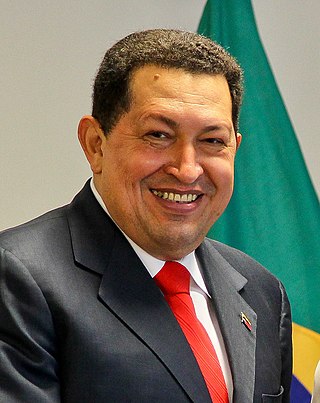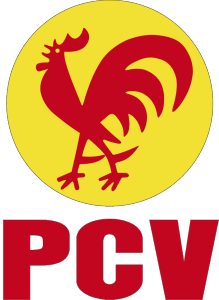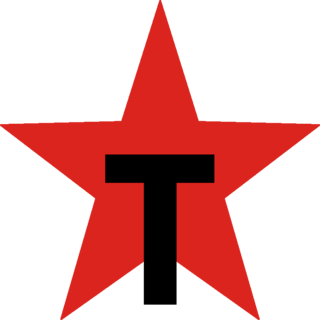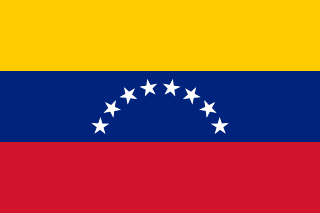Related Research Articles

Hugo Rafael Chávez Frías was a Venezuelan politician and military officer who served as president of Venezuela from 1999 until his death in 2013, except for a brief period of forty-seven hours in 2002. Chávez was also leader of the Fifth Republic Movement political party from its foundation in 1997 until 2007, when it merged with several other parties to form the United Socialist Party of Venezuela (PSUV), which he led until 2012.

The Communist Party of Venezuela is a communist party in Venezuela. Founded in 1931, it is the oldest active political party in Venezuela, and was the country's main leftist party until it fractured into rival factions in 1971. The PCV currently opposes the government of Nicolás Maduro.

Douglas Ignacio Bravo Mora was a Venezuelan politician and guerrilla fighter.
Chavismo, also known in English as Chavism or Chavezism, is a left-wing populist political ideology based on the ideas, programs and government style associated with the Venezuelan President between 1999 and 2013 Hugo Chávez that combines elements of democratic socialism, socialist patriotism, Bolivarianism, and Latin American integration. Supporters of Hugo Chávez and Chavismo are known as Chavistas.

Nicolás Maduro Moros is a Venezuelan politician who has served as the president of Venezuela since 2013.

Revolutionary Movement Tupamaro, often shortened to Tupamaro, is a far-left Marxist-Leninist communist party and one of the most prominent colectivos in Venezuela. Several Tupamaros participate in peaceful movements while some believe in the "idea of armed struggle as a means to gain power." The group supports the National Liberation Army (ELN) and allegedly had ties with Revolutionary Armed Forces of Colombia (FARC).

Relations between Cuba and Venezuela were established in 1902. The relationship deteriorated in the 1960s and Venezuela broke relations in late 1961 following the Betancourt Doctrine policy of not having ties with governments that had come to power by non-electoral means. A destabilizing factor was the Cuban support for the antigovernment guerrilla force that operates in remote rural areas. Venezuela broke off relations with Cuba after the Machurucuto invasion in 1967, when Cuban trained guerrillas landed in Venezuela seeking to recruit guerrillas and overthrow the government of Raúl Leoni. Relations were reestablished in 1974.

Antonio José Ledezma Díaz is a Venezuelan lawyer, opposition politician and former political prisoner. After unsuccessfully challenging for the leadership of Democratic Action in 1999, he founded a new party, the Fearless People's Alliance.

The level of corruption in Venezuela is very high by world standards and is prevalent throughout many levels of Venezuelan society. Discovery of oil in Venezuela in the early 20th century has worsened political corruption. The large amount of corruption and mismanagement in the country has resulted in severe economic difficulties, part of the crisis in Venezuela. A 2014 Gallup poll found that 75% of Venezuelans believed that corruption was widespread throughout the Venezuelan government. Discontent with corruption was cited by demonstrators as one of the reasons for the 2014 and 2017 Venezuelan protests.
Popular Will is a political party in Venezuela founded by former Mayor of Chacao, Leopoldo López, who is its national co-ordinator. The party previously held 14 out of 167 seats in the Venezuelan National Assembly, the country's parliament, and is a member of the Democratic Unity Roundtable, the electoral coalition that held a plurality in the National Assembly between 2015 and 2020. The party describes itself as progressive and social-democratic, and was admitted into the Socialist International in December 2014. Observers have also described it as being centrist, or centre-left.

Bolivarian propaganda is a form of nationalist propaganda, especially in Venezuela and associated with chavismo, Venezuela's socialism. This type of propaganda has been associated with Hugo Chávez's Bolivarian Revolution, which used emotional arguments to gain attention, exploit the fears of the population, create external enemies for scapegoat purposes, and produce nationalism within the population, causing feelings of betrayal for support of the opposition.

The death of Hugo Chávez, 45th President of Venezuela, was announced by government officials to have been on 5 March 2013 at 16:25 VET in Caracas, Venezuela from cancer at the age of 58. His death triggered a presidential election which was constitutionally required to be called within 30 days.

Génesis Cristina Carmona Tovar was a Venezuelan fashion model, beauty queen, and college student who was killed while protesting against the government of Venezuela during the 2014 Venezuelan protests. She later became a symbol of protest against the Nicolás Maduro government during the time of demonstrations in the country.
Anarchism in Venezuela has historically played a fringe role in the country's politics, being consistently smaller and less influential than equivalent movements in much of the rest of South America. It has, however, had a certain impact on the country's cultural and political evolution.

"Chávez eyes" is a design of stylized eyes of ex-president of Venezuela Hugo Chávez that has become pervasive throughout Venezuela among the supporters of Chávez, the Venezuelan government and PSUV that is primarily used as political propaganda for the Bolivarian government. The eyes have been seen on "billboards, T-shirts and buildings around the nation". Most of these buildings, shirts and more objects where the Chavez eyes are presented, are made from the government, in public projects planned by the current government.

In Venezuela, a cult of personality has been created around the late President Hugo Chávez, where his supporters venerate him. Chávez largely received his support through his charisma and by spending Venezuela's oil funds on the poor.
The Supreme Tribunal of Justice of Venezuela (TSJ) in exile is an institution that some, including the Organization of American States, consider to be the legitimate highest court of law in Venezuela and the head of the judicial branch, as opposed to the Supreme Tribunal of Justice. It was established on 21 July 2017 following the 2017 Venezuelan constitutional crisis. The TSJ's 33 members have been based in Chile, Colombia, Panama, and the United States due to the political crisis in Venezuela.
The negotiations during the crisis in Venezuela are the negotiation and dialogue attempts and processes between the government of Nicolás Maduro and the Venezuelan opposition. Although numerous dialogue processes and roundtables have taken place, by 2023 none had been effective in achieving a solution to the country's crisis.
Jesús Rafael Suárez Chourio is a Venezuelan military officer who served as the General Commander of the National Bolivarian Armed Forces of Venezuela from 20 June 2017 until 8 July 2019.
References
- ↑ John Acquaviva (12 February 2019). "Acquaviva VS Alberto Franceschi – Debate de la derecha venezolana" . Retrieved 15 February 2019.
- ↑ Lapatilla (15 June 2014). "Alberto Franceschi: Gobierno de la República de Venezuela en el exilio". LaPatilla.com. Retrieved 15 February 2019.
- ↑ Lara Farías, Daniel. "FRANCESCHI RESTEADO CON VOX | EL RUMBO DE ESPAÑA | EN LA CONVERSA" . Retrieved 14 November 2019.
- ↑ "Carta de Madrid". Fundación Disenso (in Spanish). Retrieved 7 December 2021.